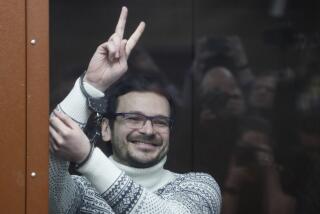Lost Physics Job, Jailed for Dissident Role : Orlov Key Figure in Rights Group
- Share via
NEW YORK — Yuri Orlov, the Soviet dissident who will be allowed to leave for the United States following the release here of an alleged spy, was a founder of the committee set up in 1976 to monitor Soviet compliance with the Helsinki accords.
Orlov, 62, was convicted in 1978 of anti-Soviet agitation and sentenced to seven years’ imprisonment to be followed by five years of exile in Siberia.
The Helsinki monitoring group, founded after the East-West accords on human rights and security and cooperation in Europe, disbanded after most of its 22 members were imprisoned or exiled. Among the members were Anatoly Shcharansky, who was freed in February.
Announced by Shultz
Orlov’s release was announced by Secretary of State George P. Shultz today after American reporter Nicholas Daniloff’s release from the Soviet Union and after U.N. employee Gennady F. Zakharov pleaded no contest to espionage charges and was ordered to leave the United States.
Shultz said Orlov is in extremely poor health as a result of severe beatings. He said Orlov and his wife will be allowed to leave the Soviet Union by Oct. 7.
Orlov was a theoretical physicist specializing in the acceleration of subatomic particles. He graduated in 1952 from Moscow State University, joined the Communist Party and worked at Moscow’s Institute of Theoretical and Experimental Physics.
In 1956, when public dissent was rare in the Soviet Union, Orlov addressed a party meeting with a proposal for democratic reforms. He was expelled from the party and lost his job.
Worked as Professor
He found work as a professor, and in 1972 was allowed to join the prestigious Institute of Earth Magnetism in the Soviet Academy of Sciences. But in 1973, when Soviet scientists were asked to sign a letter condemning physicist and dissident Andrei D. Sakharov, Orlov wrote a letter in Sakharov’s defense.
He was fired again, forced to support himself by private tutoring and became more involved in the dissident activities that led to his arrest.
Jeri Laber, executive director of Helsinki Watch, wrote in the New York Times in May that imprisonment and exile had changed Orlov. A photograph of the previously youthful-looking Orlov showed him “white-haired with a haggard, ravaged face, aged not by time but by the suffering that he has endured in a man-made hell of physical cruelty and broken dreams.”
More to Read
Sign up for Essential California
The most important California stories and recommendations in your inbox every morning.
You may occasionally receive promotional content from the Los Angeles Times.












